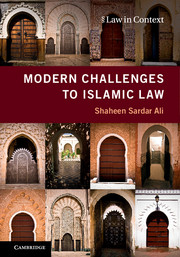Book contents
- Frontmatter
- Dedication
- Contents
- Acknowledgements
- Glossary
- Table of Cases
- Table of Legislation
- Introduction
- 1 Sharia: The Flowing Stream
- 2 An Elephant in the Room or a Needle in a Haystack? Searching for ‘Islamic’ Constitutionalism(s)
- 3 Contextualizing Family Law Reform and Plural Legalities in Post-colonial Pakistan
- 4 In Search of Legitimacy: The Dilemma of Islamic Finance
- 5 Muslim Women's Contributions to Drafting CEDAW: An Untold Narrative
- 6 CEDAW? What's That? ‘Domesticating’ ‘International’ Women's Human Rights in Muslim Jurisdictions: Reflections on Pakistan's Engagement with CEDAW
- 7 ‘Between the Devil and the Deep Blue Sea’: Sharia Councils and Muslim Women's Rights in the British Muslim Diaspora
- 8 Internet Fatawa: Challenging Tradition and Modernity in Women and Gender Issues
- Conclusion
- Bibliography
- Index
1 - Sharia: The Flowing Stream
Published online by Cambridge University Press: 05 September 2016
- Frontmatter
- Dedication
- Contents
- Acknowledgements
- Glossary
- Table of Cases
- Table of Legislation
- Introduction
- 1 Sharia: The Flowing Stream
- 2 An Elephant in the Room or a Needle in a Haystack? Searching for ‘Islamic’ Constitutionalism(s)
- 3 Contextualizing Family Law Reform and Plural Legalities in Post-colonial Pakistan
- 4 In Search of Legitimacy: The Dilemma of Islamic Finance
- 5 Muslim Women's Contributions to Drafting CEDAW: An Untold Narrative
- 6 CEDAW? What's That? ‘Domesticating’ ‘International’ Women's Human Rights in Muslim Jurisdictions: Reflections on Pakistan's Engagement with CEDAW
- 7 ‘Between the Devil and the Deep Blue Sea’: Sharia Councils and Muslim Women's Rights in the British Muslim Diaspora
- 8 Internet Fatawa: Challenging Tradition and Modernity in Women and Gender Issues
- Conclusion
- Bibliography
- Index
Summary
Introduction
The focus of any discussion on the Islamic legal traditions within Muslim communities is sharia. The very word evokes radically different responses from different constituencies: while the vast majority of Muslims perceive it as a path of guidance, some Muslims, and the popular Western media, ascribe to it mostly negative meanings, often confining it to the field of criminal justice, the use of brutal punishments and the oppression of women. At an ideological level, some consider its application a panacea for all the ills befalling Muslims, whereas others regard it as the main obstacle to progress. As to its scope, it is believed by some to be the equivalent of ‘Islamic law’, and by others to be an all-encompassing framework for how Muslims ought to lead their lives, extending well beyond the legal realm. One of the main questions that arise from this, then, is what precisely do those various protagonists understand by sharia? Bearing in mind that sharia has fourteen centuries of history behind it, it is not my intention here to engage in a straight historical account. I am aware of the jurisprudential complexities arising from multiple interpretations of the Qur'an and Sunna, from the origins and development of the various schools of juristic thought in Islam, and their bearing on sharia. This chapter is not about Islamic fiqh (jurisprudence). Instead, the insights presented here are meant as signposts to how sharia is understood and employed by Muslim states and governments, and in the lived realities of Muslims at an individual and collective level.
Divine injunctions and human endeavours have together created an evolving set of regulatory norms for all aspects of Muslim life. Themes such as pluralism, tradition, modernity, contestation over authority and authenticity, fragmentation of authority, and globalization have informed this evolution and underlie the various chapters of Modern Challenges. Each demonstrates aspects of the discursive nature of the sharia, evolving and resilient in the face of challenges and questions posed to it by tradition and modernity. What, for instance, are the mechanisms applied to understanding the sharia? Has the sharia undergone a reductive process whereby its moral and ethical dimension has been sidelined and legal elements placed centre stage, or vice versa? How have tradition and modernity impacted on sharia?
- Type
- Chapter
- Information
- Modern Challenges to Islamic Law , pp. 20 - 40Publisher: Cambridge University PressPrint publication year: 2016



